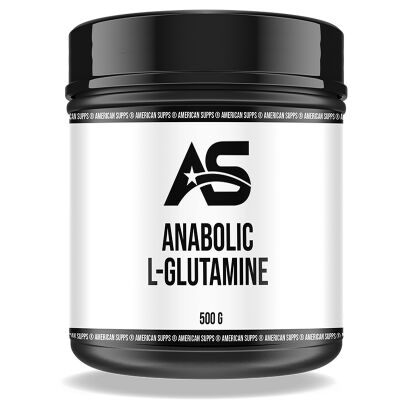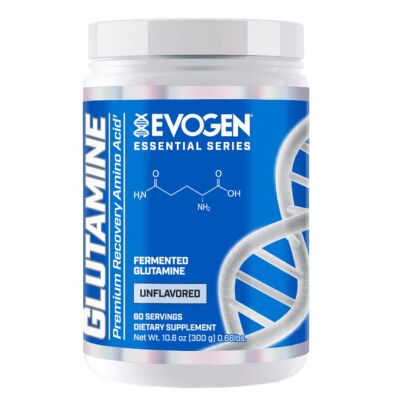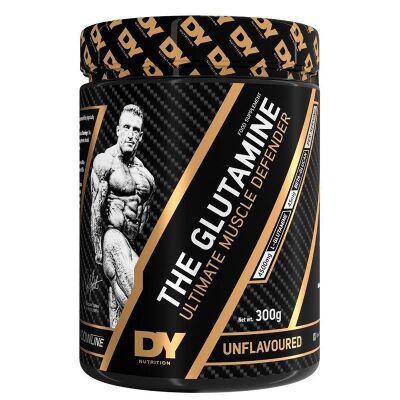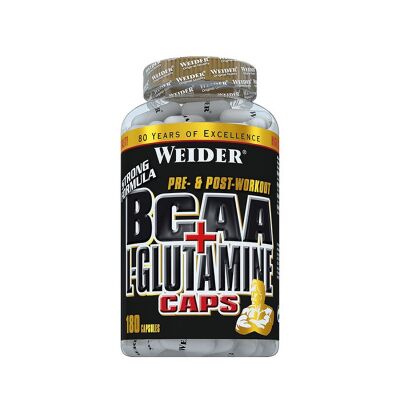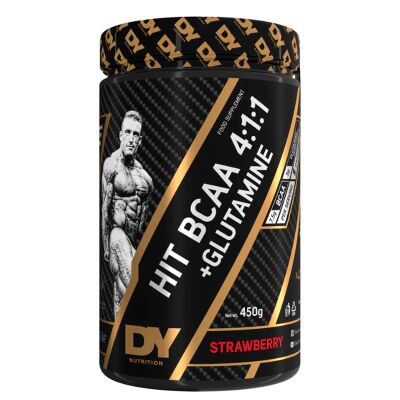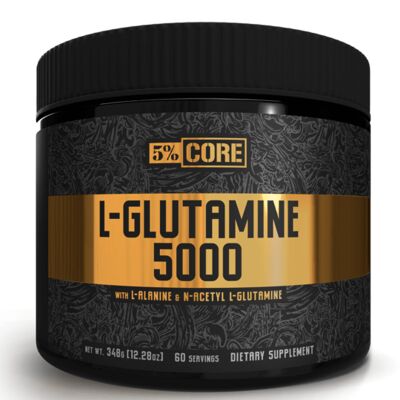Glutamine
Glutamine and L-glutamine buy in our bodybuilding shop
Glutamine, or L-glutamine or L-glutamine is a semi-essential amino acid that the body can produce itself, but is insufficiently available in certain situations. Glutamine is the most abundant free amino acid in the body. Glutamines are involved in several metabolic processes. The concentration of L-glutamine in cells is about four times higher than that in plasma. Glutamine is produced in most types of tissue, from where it is then released into the blood. The brain, lungs, adipose tissue and skeletal muscles can produce a particularly large amount of glutamine.

Glutamine effect
Glutamine does many things in the body
- Regulation of the balance between catabolism and anabolism
- Regulation of cell volume
- Acid-base balance
- Formation of the intestinal hormone gucagonlike peptide-1
- Metabolism of protein, fat and carbohydrates
- Production of glutathione (detoxifier and antioxidant)
- Production of purines and pyrimidines (building blocks of DNA and RNA)
- Nitrogen transport and elimination of ammonia
- Building material for proteins
- Strengthening the immune system
Glutamines in bodybuilding
The muscle tissue is the body's largest producer of glutamine, with L-glutamine also being the driving force behind the process of building muscle. Of the approximately 20 different amino acids, glutamine is the most common and also the most required amino acid in muscle tissue. If there is not enough glutamine, protein synthesis or protein biosynthesis stops, i.e. no more protein is converted into muscle mass. During a strenuous physical training session, the situation can arise that the glutamine level drops very sharply. It can take a few hours for the glutamine level to rise again. Overtraining can prevent glutamine levels from fully recovering. In athletes who are permanently under constant stress, such as excessive training and diet phases, the glutamine level can temporarily be disrupted. This can sometimes lead to years of low glutamine levels in the plasma.
Glutamine Deficiency and the Consequences
Even if glutamine is abundant in the body, a glutamine deficiency can develop and have serious consequences. Endurance athletes such as marathon runners are particularly affected. This makes it clear why glutamine supplementation is not only useful for bodybuilders who want to build muscle, but also for endurance athletes who like to jog.
- Decrease in the quality and function of the intestinal epithelium
- Increasing the risk of infections and allergies
- Slowing down of wound healing
How necessary are glutamines?
Healthy people produce enough glutamine themselves, but there are situations in which L-glutamine becomes an essential amino acid. Especially with heavier loads, such as illness, stress or even during sport. The muscles release the stored L-glutamine in order to use it in the body where it is needed. If the load is too long, the glutamine levels in the muscles are restored. If the stress phases are long-lasting, the need for L-glutamine is particularly high. If there is insufficient L-glutamine, the muscles can be damaged or an immune deficiency can occur. Glutamine uptake in the small intestine can decrease radically, especially in stressful situations or in case of malnutrition such as diet.
Difference between glutamine and glutamate
Some people know it, the so-called Chinese restaurant syndrome. After a long meal at a Chinese restaurant, you fall into a deep state of tiredness and even headache. There are people who appear to be overly sensitive to glutamate. Glutamate is the sodium salt of glutamic acid and is used as a flavor enhancer in many ready meals such as instant soups, sauces and meals. It is important that glutamate is not confused with the amino acid L-glutamine.
L-glutamine and its benefits for bodybuilding
Whether your goal is to increase your athletic performance, increase your metabolism, improve recovery, or even build muscle, research shows that L-glutamine is a must have supplement. During intense exercise, your body becomes stressed and the muscles and tendons require more glutamine than the amount supplied by a normal diet. After intensive training, the level of cellular glutamine can drop by 50 percent and in the plasma level by 30 percent! This state is a message for the body to convert your muscles into energy instead of carbohydrates. But glutamine can prevent that. Supplementing with L-glutamine allows your muscles to fight and push even further, which increases your strength and repairs your skeletal muscles. One study found that an L-Glutamin supplementation makes it possible to recover faster from intense strength training as it improves muscle hydration. This helps build muscle and reduces recovery time. Refilling your glutamine levels after an intense workout can take up to five days, so it is important to take it regularly if you are exercising intensely.
Foods with high in L-glutamine
Even when the body synthesizes L-glutamine from glutamic acid or glutamate, sometimes it cannot make enough of it. If it does, the body needs to get it straight from the diet. L-glutamine can be found in animal proteins such as meat and dairy products, along with plant protein sources such as beans, raw spinach, parsley, and red cabbage. It is worth noting, however, that animal proteins are not as easily
- 1.Beef consommé
- 2. Grass-fed beef
- 3. Spirulina
- 4. Chinese cabbage
- 5. Cottage cheese
- 6. Asparagus
- 7. Broccoli Raab
- 8.Wild fish (cod, tuna and salmon)
- 9. Deer
- 10. Turkey
Taking L-Glutamine
L-glutamine should be taken twice a day with meals and then 5 g each.
That means the minimum dose of L-glutamine is 10 g per day. You are of course also welcome to take more. My personal experience has shown me that 15-20 g of glutamine is better than just 10 g a day. Since L-glutamine is the most common amino acid in the body, the high dose also makes sense.
